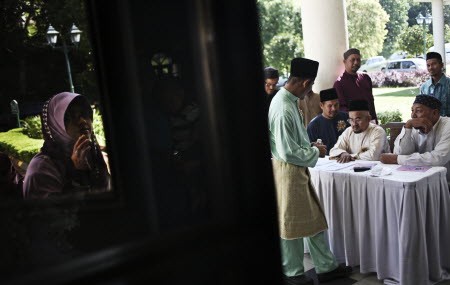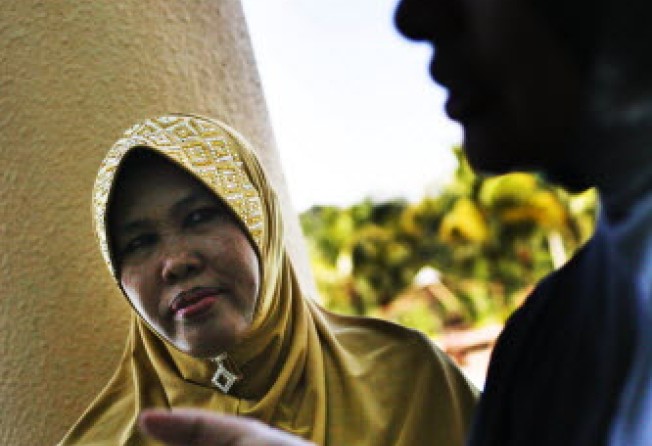
The Obedient Wives Club: for better or for worse
A club that teaches brides how to keep their husbands happy in bed has sparked outrage in Malaysia by claiming that women should take the blame for domestic violence and spousal infidelity, reports Liz Gooch.

THIS ARTICLE WAS FIRST PUBLISHED IN POST MAGAZINE ON JUNE 26, 2011.
With tiaras perched atop headscarves, 10 young brides are seated beside their grooms at a long table adorned with yellow and white flowers. The young couples were all married recently and are in this function room, at a golf club on the outskirts of the Malaysian capital, Kuala Lumpur, to celebrate their nuptials.
However, that is not the only reason they have come here this morning - the young women are dedicating themselves to becoming not just wives, but good wives. And the key to becoming a good wife, according to those who have organised the event, is simple: obey your husband.
To be precise, have dinner waiting for him when he gets home; make sure the children are tucked up in bed; dress in sexy clothes; smell nice; and be ready to meet his every sexual need.
'The wife should entertain the husband more than the first-class prostitute,' says Fauziah Ariffin, the president of the Malaysian branch of the Obedient Wives Club, a group that has stoked controversy by blaming women for domestic violence, divorce and pushing their husbands into the arms of prostitutes. Organisers claim that if wives would only be more sexually obliging, the world would be free of 'social ills'.
Established by a Malaysian company that has links to a banned Islamic sect and runs a group that promotes polygamy, the club invited the 10 young couples as special guests to its launch earlier this month.
The club has been met with widespread condemnation in Malaysia, angering women's groups, who say the club doesn't reflect Islamic values. The backlash has spread among the public, with many letters in mainstream newspapers slamming the group and thousands of people signing up to an online campaign against the club.
Listening to the leaders of the club explain their raison d'?tre, it's no surprise their ideas have stirred such emotions. Indeed, their message appears to have been carefully crafted to garner maximum publicity.
'Husbands straying, illicit sex, domestic violence - all these social ills we believe start at home,' says Rohaya Mohamad, the club's international vice-president. She says billions of dollars have been wasted trying to tackle problems such as domestic violence and human trafficking when these problems are, in fact, caused by the shortcomings of wives.
'If a man is not satisfied in his sexual needs or his mind or spiritually, he becomes violent. A hungry man is an angry man,' says Rohaya, adding that such men are compelled to turn to prostitutes. 'They come home and see a wife who smells bad or doesn't dress up well, doesn't perform sex well and then nagging, things like that, it doesn't help, so he strays.'
A good wife is one who obeys her husband, meets his sexual needs and takes care of the home, she says, adding that Malaysia is currently lacking such women.
'We hope by launching this club there will be more women of that sort. At the moment it doesn't happen very much,' she says.
The club plans to teach wives about men's sexual needs and counsel couples on how to maintain a good marriage. While its ideals may hark back to the concept of love, honour and obey, Rohaya considers the club's focus on sex to be groundbreaking, because, she says, sex is still considered a taboo topic in many Asian societies.
'Good women are perceived as prim and proper - a good cook, a good mother, but not good in bed. We want to change all that and say she has also got to be good in bed.'
Global Ikhwan, the company behind the Obedient Wives Club, has a range of businesses in Malaysia and overseas, including food-processing factories, supermarkets and pharmacies. It hit the headlines in 2009, when it launched a club to promote polygamy. In Malaysia, a Muslim man may legally marry up to four wives, as long as he obtains permission from a sharia court.
A spokeswoman for the Department of Islamic Development, which is responsible for the administration of Islam in Malaysia, says Global Ikhwan is being investigated because of its links to Al-Arqam, an Islamic group banned in Malaysia in 1994 for 'deviant' religious teachings. The spokeswoman says the department is concerned the company is still conducting teachings that do not comply with Islam and was under investigation prior to the launch of the club.
One of the numerous women's rights organisations to have expressed disgust at the club's philosophy is Sisters in Islam, a Muslim advocacy group based in Kuala Lumpur. Ratna Osman, the group's acting executive director, says the club is 'yet another manifestation of the persistent women-blaming that afflicts almost every discussion of social issues, such as divorce and sexual assault'. She rejects the view that women are to blame for domestic violence and for causing men to visit prostitutes.
'Abusive men often use women's behaviour as a sick justification, but, in the end, their actions are their responsibility. There is always a choice whether to use violence or not, and these men choose [to use] their fists,' she says.
While the club's organisers claim they are promoting a more Islamic way of life, Ratna likens their views to those of 'right-wing, American anti-feminists', such as Laura Schlessinger, who argues that women must not neglect their husbands if they want a happy marriage, in her book, The Proper Care and Feeding of Husbands.
Sisters in Islam also strongly disagrees with the club's interpretation of the Koran regarding a wife's role.
'For us, it's very clear that Islam has always propagated equality and justice in the family,' says Ratna.
While one mufti, or Islamic leader, has reportedly backed the formation of the club, many religious leaders and scholars have been critical.
Mohammad Tamyes Bin Abdul Wahid, the mufti of Selangor, the state in which the club was launched, says its objectives 'downgrade women's integrity'. He says the club should not manipulate issues such as sex simply to attract the public's attention.
'We don't need such a club to give advice on sexual relationships between a husband and a wife, as Islam does not allow such personal matters to be openly discussed and shared with the public,' he said.
Ratna says the club reflects a patriarchal interpretation of Islam, wherein women are considered to be the only ones responsible for upholding family values. With the club attracting widespread media attention, Sisters in Islam is concerned that this image of Malaysian Muslim women is being spread internationally.
'It's very sad that it has come to this in the 21st century,' says Ratna, adding that more attention should be paid to the real issues of concern for Muslim women, such as the problems they experience in obtaining a divorce and polygamy. In Malaysia, Muslim women often wait years for the sharia court to grant them a divorce and many encounter great difficulty in obtaining maintenance from their former husbands.
Sisters in Islam has interviewed 1,200 men, women and children involved in polygamous families and found such marriages are often detrimental to all involved.
'These are the social issues we need to look at,' says Ratna.
The Ministry of Women, Family and Community Development says that while individuals have the right to form associations, the principle of equality in marriage must be upheld.
'To hinge fidelity, domestic violence and the fulfilment of a husband's responsibilities purely on a wife's capacity to be obedient, stimulate sexual arousal and prepare food is not only demeaning to wives, but to husbands as well,' the ministry says. 'Both husband and wife are independent agents responsible for their own actions. As a result, it is not the incapacity of women 'to obey, serve and entertain' that leads to the existence of all social ills.'
Judging from the public reaction, the group appears to have little mainstream appeal in Malaysia, where women hold top posts in banks and other businesses. A Facebook group titled 'We Do Not Want Sexist Nonsense From Global Ikhwan' has attracted more than 5,600 members while numerous letters to the editor have denounced the group.
'This is the year 2011. Such primitive mentality got buried with the dinosaurs,' states May Chee Chook Ying of Malacca, in a letter published in the New Straits Times.
But those who have joined the club, which claims to have 800 members in Malaysia and 200 in the Middle Eastern country of Jordan, where it held a smaller event this month, appear convinced the club's teachings will help bring them marital bliss.
Siti Ruqaiyah says she and her husband, Afdhalludin Abdulrahman, both 21, decided to join the club after her mother recommended it. Her mother, a member of the polygamy club, is one of two wives. Both religious teachers in a private school in Kuala Lumpur, Siti and Afdhalludin had never met before they were married last month.
Siti says that while her husband's role is to be a provider and that he is 'responsible for bringing me to God', her role is to be obedient to her husband. '[The club] will teach me to be a good wife,' she says.
When asked whether he plans to take another wife, Afdhalludin nervously looks at his spouse. She replies for him: 'If God is willing, yes, he will have another wife.'
Pressed for an answer, Afdhalludin says: 'If I'm able to, yes.'
Rohaya, one of four wives, says polygamy can help ensure a husband's needs are met. She often travels abroad to help manage Global Ikhwan's overseas businesses and works as a medical doctor. She says the other three wives help out when she is away.
Ummi Hani Binti Lokman Pfordten, the daughter of Fauziah, is one of the young brides at the club's launch. The shy 19-year-old is reluctant to discuss her reasons for joining the club, deferring to her husband, Muhammad Shurabil Bin Amram, 23, who returned to Malaysia for the marriage, which was arranged by the families, from Mecca, Saudi Arabia, where he is studying Arabic and Islamic studies.
'When I was studying I saw a lot of marriages where the woman was not obedient to the husband. When I got married, I wanted a wife who is able to help me,' he says. 'A lot of divorce is because there's no love between the husband and wife. There's a lot of clashes. We want to avoid all this.'
After much prodding, Ummi says she does not believe the club is sexist: 'I disagree with groups that say it's not fair on women, because to be obedient to my husband is a wife's responsibility, and that is asked for by God.'
Fauziah says she wants her daughter to be part of the club to help her have a successful marriage.
'When she can be loyal and can entertain her husband, her husband will love her and be loyal to her in return,' she says.
The club, which is open to people of all religions, launched an Indonesian branch last Saturday and organisers say they want to investigate the possibility of opening in other countries, from the Middle East to Europe.
'We hope it can be accepted universally,' Fauziah says. 'We believe if it comes from God, even the West can accept it eventually.'